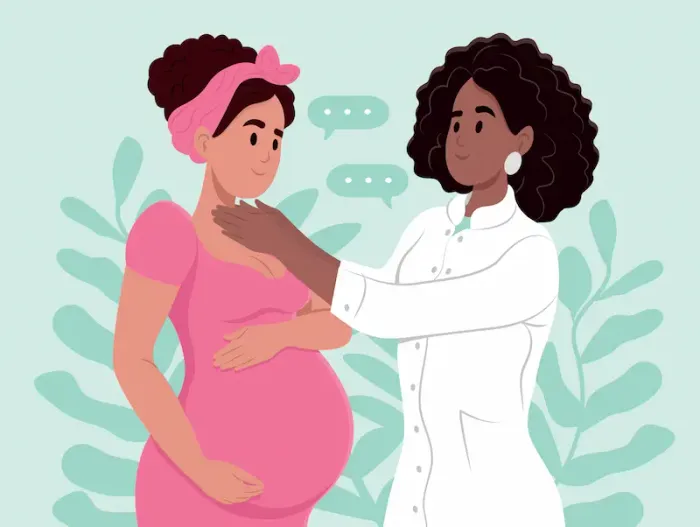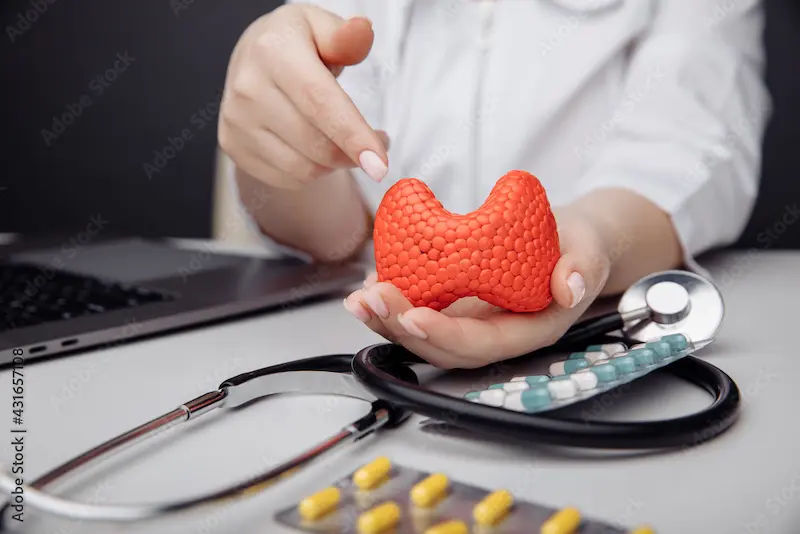Hypothyroidism and Pregnancy: A Guide to a Healthy Journey
Discover how hypothyroidism affects pregnancy, from symptoms and diagnosis to treatment and nutrition, for a safe and healthy journey for mother and baby.

Written by Dr. Siri Nallapu
Reviewed by Dr. Dhankecha Mayank Dineshbhai MBBS
Last updated on 13th Jan, 2026

Introduction
Pregnancy is a beautiful journey of transformation, and your body works tirelessly to support your growing baby. Often, an unsung hero in this process is a small, butterfly-shaped gland in your neck: the thyroid. When functioning properly, you barely think about it. But when it's underactive—a condition known as hypothyroidism—it can need extra attention to ensure both your health and your baby's. Hypothyroidism during pregnancy is more common than you might think, and the symptoms, like fatigue and weight gain, can easily be mistaken for normal pregnancy experiences. This comprehensive guide will walk you through everything you need to know—from recognising the signs and understanding the risks to effectively managing the condition with your healthcare team. Whether you're planning a pregnancy or are already expecting, being informed about your thyroid is a powerful step towards a healthy outcome for you and your little one.
What is Hypothyroidism?
Hypothyroidism, or an underactive thyroid, occurs when your thyroid gland doesn't produce enough of the crucial hormones thyroxine (T4) and triiodothyronine (T3). These hormones are metabolic powerhouses, regulating how your body uses energy. During pregnancy, their role becomes exponentially more important.
The Thyroid's Role in a Healthy Pregnancy
Your thyroid hormones are vital for your baby's brain development and nervous system, especially during the first trimester when the baby relies entirely on your supply. They also support your own body’s increased metabolic demands, helping to regulate your heart rate, energy levels, and body temperature throughout pregnancy.
Causes of Hypothyroidism in Expectant Mothers
Hashimoto's Thyroiditis: The Most Common Cause
The leading cause of hypothyroidism during pregnancy is Hashimoto's disease, an autoimmune disorder. In Hashimoto's, your immune system mistakenly attacks and slowly destroys your thyroid gland, impairing its ability to produce hormones. Pregnancy can sometimes trigger or exacerbate autoimmune conditions.
Other Potential Causes
Other causes include previous surgical removal of the thyroid, radiation treatment, or certain medications. In some parts of the world, severe iodine deficiency is a significant cause, though it's less common in areas with iodised salt.
Recognising the Symptoms: Pregnancy or Thyroid Issue?
This is the biggest challenge, as the signs are often identical.
Common Symptoms That Overlap with Pregnancy
• Unusual tiredness or fatigue
• Weight gain or difficulty losing weight
• Feeling cold
• Muscle cramps
• Constipation
• Dry skin and hair
Signs That May Point Specifically to Thyroid Dysfunction
While no single symptom is a sure sign, a combination of these, especially if severe, should prompt a discussion with your doctor:
• A goitre (visible enlargement of the thyroid gland)
• Pronounced and persistent hoarseness
• Extreme fatigue that doesn't improve with rest
• Significant hair loss or brittle nails
• Depressed mood or cognitive fogginess that feels abnormalConsult a Gynaecologist for Personalised Advice
Why Diagnosis and Treatment are Non-Negotiable
Left unmanaged, hypothyroidism and pregnancy can be a risky combination.
Risks of Untreated Hypothyroidism to the Mother
• Pre-eclampsia (a dangerous spike in blood pressure)
• Anaemia
• Miscarriage
• Preterm birth
• Placental abruption
• Postpartum haemorrhage
Risks of Untreated Hypothyroidism to the Baby
• Impaired brain development and lower IQ
• Low birth weight
• Stillbirth
• Congenital hypothyroidism (though this is also screened for at birth)
The good news? These risks are dramatically reduced with proper treatment and monitoring.
Getting Diagnosed: Thyroid Tests in Pregnancy
Diagnosis is simple and involves a blood test.
Understanding TSH and T4 Levels
• TSH (Thyroid-Stimulating Hormone): Produced by the pituitary gland, TSH tells your thyroid to work. High TSH levels indicate your thyroid isn't working hard enough (hypothyroidism).
• Free T4: This measures the actual amount of the active thyroid hormone available in your blood. Low Free T4 confirms hypothyroidism.
Trimester-Specific Target Ranges: What's "Normal"?
This is critical. "Normal" TSH levels are lower in pregnancy.
• First Trimester: 0.1 - 2.5 mIU/L
• Second Trimester: 0.2 - 3.0 mIU/L
• Third Trimester: 0.3 - 3.0 mIU/L
Your doctor will use these pregnancy-specific ranges to guide treatment. If you are experiencing symptoms, consult a doctor online with Apollo24|7 to discuss whether thyroid testing is right for you.
Treatment and Management: Levothyroxine and Beyond
The goal is simple: replace the hormone your body isn't making.
How Levothyroxine Safely Supports You and Your Baby
Levothyroxine is a synthetic version of your natural T4 hormone. It is identical to what your body makes and is extremely safe during pregnancy, posing no risk to your developing baby. It is essential for healthy foetal development.
The Importance of Timing and Consistency
Take your medication on an empty stomach, ideally 30-60 minutes before breakfast or any other medication or prenatal vitamin, as calcium and iron can block its absorption. Consistency is key to maintaining stable hormone levels.
Frequency of Monitoring and Dosage Adjustments
Your needs will change. It's common for your levothyroxine dosage requirements to increase by 30-50% during pregnancy. You will likely need blood tests to check your TSH levels every 4-6 weeks for the first half of your pregnancy and at least once per trimester thereafter to ensure your dosage remains optimal.
Diet and Nutrition: Supporting Thyroid Health
Medicine is primary, but nutrition plays a supporting role.
The Critical Role of Iodine
Iodine is the fundamental building block of thyroid hormones. Ensure you are using iodised salt and eating iodine-rich foods like dairy, eggs, and seafood. Your prenatal vitamin should also contain iodine (150-220 mcg).
Selenium and Other Important Nutrients
Selenium helps activate thyroid hormones. Brazil nuts, tuna, and sardines are excellent sources. A balanced diet rich in whole foods is best.
Foods to Enjoy and Foods to Be Cautious With
• Enjoy: Most fruits, vegetables, lean proteins, and whole grains.
• Be Cautious: Cruciferous vegetables (broccoli, cauliflower, kale) are fine in normal cooked amounts but avoid consuming extremely large quantities daily raw. Soy-based foods are also safe in moderation but should not be consumed at the same time as your medication.
The Postpartum Period: What to Expect Next
Your journey doesn't end at delivery.
Monitoring Your Thyroid After Delivery
Your dosage will likely need to be reduced back to your pre-pregnancy level. A TSH test is typically done about 6 weeks postpartum.
Postpartum Thyroiditis: A Common Temporary Condition
This is an inflammation of the thyroid that affects up to 10% of women, often causing a temporary period of hyperthyroidism (high hormones) followed by hypothyroidism. It often resolves on its own but requires monitoring. If you experience new fatigue, mood swings, or anxiety after delivery, discussing postpartum thyroiditis symptoms with your doctor is important.
Planning a Future Pregnancy with a Thyroid Condition
If you have hypothyroidism and are planning another pregnancy, preconception counselling is vital. The goal is to optimise your TSH levels to below 2.5 mIU/L before you conceive to create the best possible environment for your baby's early development.
Conclusion: Empowering Yourself for a Healthy Pregnancy
A diagnosis of hypothyroidism during pregnancy might feel overwhelming, but it is a highly manageable condition. By understanding the importance of your thyroid, recognising the symptoms, and committing to regular monitoring and medication, you are taking profound steps to protect your well-being and give your baby the best start in life. This journey is a partnership between you and your healthcare team. Ask questions, be proactive about your tests, and trust that with today's medical knowledge, you can confidently have a healthy and successful pregnancy. If your condition does not improve after trying these methods, book a physical visit to a doctor with Apollo24|7 for a comprehensive evaluation and personalised care plan.Consult a Gynaecologist for Personalised Advice
Consult a Gynaecologist for Personalised Advice

Dr Jaya Kumar Agarwal
Obstetrician and Gynaecologist
25 Years • MBBS , DGO , DNB (obstetric and gynecology) DGE diploma in Gyne endoscopy (Germany )
Delhi
Apollo Hospitals Indraprastha, Delhi

Dr. Vidya Konduri
Obstetrician and Gynaecologist
13 Years • MS
Chinagadila
Apollo Hospitals Health City Unit, Chinagadila
(50+ Patients)

Dr. Karuna Ratwani
Obstetrician and Gynaecologist
11 Years • MBBS, MS( Obstetrics & Gynaecology), F.MAS, FICRS Advanced Diploma in Minimal Access surgery Fellow of International College of Robotic Surgeons Diploma in Reproductive Medicine, Kiel-Germany Masters in Cosmetic Gynaecology , Greifswald-Germany Masterclass in Obstetrics & Gynaecology Ultrasound ( ISUOG, UK)
Delhi
Apollo Hospitals Indraprastha, Delhi
(25+ Patients)

Dr. Swetha P
Obstetrician and Gynaecologist
11 Years • MBBS, MS(OBGY)
Hyderabad
Apollo Hospitals Jubilee Hills, Hyderabad
(50+ Patients)

Dr. Sowbarnika Ramamoorthy
Obstetrician and Gynaecologist
20 Years • MD.DNB.MNAMS. FMAS, MRCOG (LONDON)
Chennai
Apollo Women Hospitals Thousand Lights, Chennai
(50+ Patients)
Consult a Gynaecologist for Personalised Advice

Dr Jaya Kumar Agarwal
Obstetrician and Gynaecologist
25 Years • MBBS , DGO , DNB (obstetric and gynecology) DGE diploma in Gyne endoscopy (Germany )
Delhi
Apollo Hospitals Indraprastha, Delhi

Dr. Vidya Konduri
Obstetrician and Gynaecologist
13 Years • MS
Chinagadila
Apollo Hospitals Health City Unit, Chinagadila
(50+ Patients)

Dr. Karuna Ratwani
Obstetrician and Gynaecologist
11 Years • MBBS, MS( Obstetrics & Gynaecology), F.MAS, FICRS Advanced Diploma in Minimal Access surgery Fellow of International College of Robotic Surgeons Diploma in Reproductive Medicine, Kiel-Germany Masters in Cosmetic Gynaecology , Greifswald-Germany Masterclass in Obstetrics & Gynaecology Ultrasound ( ISUOG, UK)
Delhi
Apollo Hospitals Indraprastha, Delhi
(25+ Patients)

Dr. Swetha P
Obstetrician and Gynaecologist
11 Years • MBBS, MS(OBGY)
Hyderabad
Apollo Hospitals Jubilee Hills, Hyderabad
(50+ Patients)

Dr. Sowbarnika Ramamoorthy
Obstetrician and Gynaecologist
20 Years • MD.DNB.MNAMS. FMAS, MRCOG (LONDON)
Chennai
Apollo Women Hospitals Thousand Lights, Chennai
(50+ Patients)
More articles from Hypothroidism
Frequently Asked Questions
1. Can hypothyroidism make it harder to get pregnant?
Yes, untreated hypothyroidism can disrupt your menstrual cycle and inhibit ovulation, making conception more difficult. Proper management normalises thyroid function and significantly improves fertility.
2. Will I have to stay on thyroid medication after I give birth?
Most likely, yes. Your dosage will probably be reduced to your pre-pregnancy level, but if your hypothyroidism is chronic (like from Hashimoto's), you will need to continue medication for life, as it replaces a hormone your body cannot produce on its own.
3. Is it safe to breastfeed while taking levothyroxine?
Absolutely. Levothyroxine is secreted into breast milk in minimal amounts that are not harmful to your nursing baby. It is considered completely safe for breastfeeding.
4. What are the ideal TSH levels for trying to conceive?
If you have known hypothyroidism and are planning a pregnancy, doctors recommend optimising your TSH level to be between 1.0 and 2.5 mIU/L before conception to support the baby's earliest stages of development.
5. Can hypothyroidism during pregnancy cause autism?
While severe, untreated hypothyroidism has been linked to various developmental delays, current research does not show a direct, consistent causal link between managed maternal hypothyroidism and autism spectrum disorder. Proper treatment mitigates most developmental risks.

